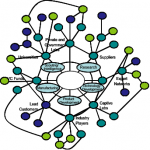Open Innovation is a key skill and part of a process for many companies in their search for sustainable growth.
To achieve a step change in growth an organisation needs to look outside its core competencies and explore new opportunities. However for technical staff this can also mean a step out of their own comfort zone.
It can be intimidating to pick up the phone to an international expert who has a specialist interest in an area that you are unfamiliar with. This is particularly true if you are used to being an authority in your own field and rarely have professional contact outside your industry sector.
A common mistake is to give too much detail too soon. You need to ‘do the dance’ to discover whether this expert has relevant knowledge, is the right person to talk to or indeed, if you are giving away information to a potential competitor.
At nu Angle we are used to building international networks of experts that can help inform the development of new growth platforms. We source them through a combination of desk research and personal referrals and engage with them to determine the scope of their knowledge and its applicability to the challenge we are addressing.
Based on our experienes, we have designed, developed and delivered a new service for clients called ‘Building an Expert Network’ that helps them to assimilate this expertise and provides the techniques and processes required by in-house teams.
Many of our clients want to develop capacity in-house to build expert networks, so they can keep abreast of technology developments. This can be very lucrative. Identifying multi-million dollar growth platforms is something most companies want to be able to do. However, the people tasked with doing this prospecting are usually not accustomed to making cold calls and may even shudder at the prospect.
The nu Angle service is designed to support these technologists. It includes discussion of an investigative framework to identify what information is required and how to capture it in a meaningful way, advice on how to approach the process and practical skills development, using ‘real’ experts with appropriate knowledge.
Often there is a need to look at the issue from a new perspective by ‘framing the need’. A common mistake by the inexperienced is to look for a solution from technology experts in a known field. By framing the need to be addressed rather than defining the solution, there is an opportunity for lateral thinking and to find new approaches.
For example, one of our clients wanted to manage bubbles in fruit juice. By reframing the need as ‘controlling the size of bubbles in a liquid’ we could look wider than the beverage industry. We looked at the way bubbles were controlled within chocolate production, sewerage, glass manufacture and biotechnology. This led us to an expert in physical chemistry who also had an interest in champagne and the result was a new generation of fruit drinks.
Although the Internet and guided desk research are useful, much more can be achieved from one (or, more usually, several) good telephone call(s). How to prepare for those calls, gain the information required and turn a name into a useful component of a contact network are all elements of the service that we provide.
Now let me make that call.
– ENDS –

